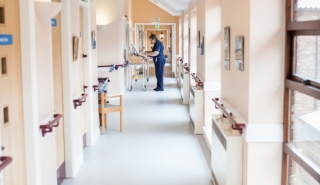#OneTrustOneTeam
Click on the photos below to read our stories
This site uses cookies. By continuing to browse the site you are agreeing to our use of cookies. Find out more here. Hide this message
You are here: Home > News & media > #OneTrustOneTeam
Click on the photos below to read our stories
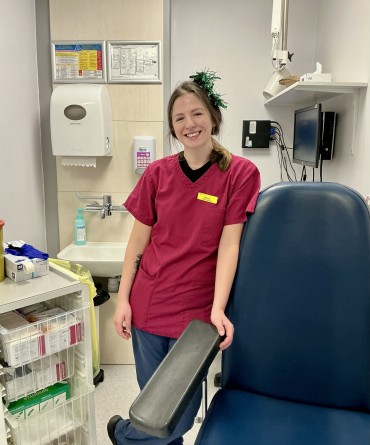
Say hello to Becca Snow-Holliday, a Phlebotomist based at York Hospital.
Through December, we’re adding a bit of festive sparkle to our weekly #OneTrustOneTeam campaign, featuring colleagues with festive names and taking a peek behind the scenes at how our people are celebrating this Christmas.
My role as a phlebotomist includes working in different areas of the hospital, both inpatients and outpatients, taking blood and delivering it to the labs. This means patients get results quicker and more efficient to fast track better health.
10 in the NHS! Five of those in Scotland, one in Lincoln, and four here at York.
I believe cheer is spread with good attitude, some tinsel in the hair, music, and a big ol’ smile!
Us phlebotomists would be The Grinch. Everyone dislikes seeing us arrive to visit them, but by the end of their time with us, they get to know us – as we do them – and understand we care and our doing our bit to help them get better.
I haven’t nominated anyone yet but, wow, who would I choose? Our team is so resilient and hardworking – I think every one of them deserves it!
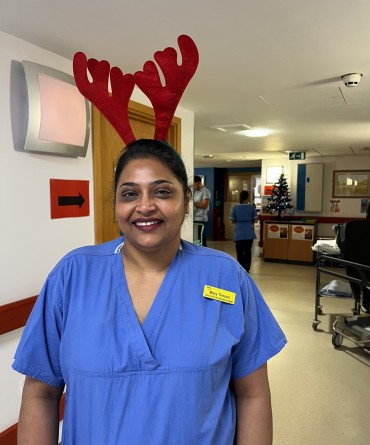
Say hello to Mary Joseph Timson, Clinical Educator in Theatres and PACU.
Through December, we’re adding a bit of festive sparkle to our weekly #OneTrustOneTeam campaign, featuring colleagues with festive names and taking a peek behind the scenes at how our people are celebrating this Christmas.
As a clinical educator, my role is to build confidence, enhance competence, and promote excellence in patient care by providing colleague education, assessing skills, and supporting continuous professional development.
This year marks my 20th Christmas at the Trust and, over the past two decades, colleagues have become family, sharing kindness, supporting each other through every challenge, and celebrating countless moments of excellence together. At Christmas, that sense of togetherness shines even brighter. Here’s to another season of compassion and festive cheer!
Christmas, to me, is a season of faith, reflection, and gratitude... a time to pause, appreciate our blessings, and come together with family, friends, and the teams we work alongside. In theatres and PACU, we often meet patients when they’re at their most vulnerable, and the festive season can make those moments feel even more poignant. Offering comfort, reassurance, or even a small smile reminds me that Christmas is really about compassion, connection, and caring for one another. As a small clinical education team across sites, we may be few, but we’re driven by kindness.
This year, we’re adding festive touches to shared spaces, bringing in treats and warm drinks, and adding some seasonal fun to our teaching sessions. We’re also taking time to celebrate together, sharing a Christmas meal at Ellerby’s, joining Trust-wide competitions, and attending department festivities. Above all, we’re checking in with colleagues, offering support and encouragement during this busy period. Our aim is simple: to help ensure that everyone, patients and staff alike, feels valued, supported, and cared for during this special season.
I’d be like the guiding star in The Nativity Story, not the main character, but a light that helps others find their way. As a Clinical Educator in theatres, I see our roles as a guiding star helping colleagues shine, sharing knowledge, and creating a calm, supportive environment.
Yes, I have! I nominated colleagues for the Kindness Elf Award and the Hidden Hero Elf Award because they truly embody the spirit of Christmas in theatres. They’re the first to offer help, the first to lift others up, and the last to seek recognition for themselves. Their kindness and openness create a supportive environment, and their dedication and calm presence ensure excellence in patient care, even when the festive season gets hectic. It felt important to celebrate the light they bring to our team and the difference they make every day.
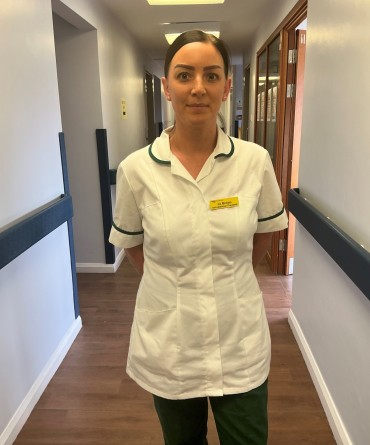
Say hello to Jo Brown, an Occupational Therapist based at Nelsons Court.
I’m a newly qualified Occupational Therapist (OT), having completed a three-year apprenticeship. I help inpatients regain their independence and improve their quality of life through meaningful, goal-based rehabilitation. My role is not just about the physical needs of my patients, but the emotional, cognitive, and environmental factors that may impact their recovery, too. Every day is different, and the work is incredibly rewarding, particularly when I see patients making progress.
I’ve been at the Trust for five years. I initially began on the wards and stroke unit as a rehabilitation assistant. From day one, I’ve been surrounded by supportive colleagues who have helped me learn, grow, and develop my confidence. What I value is the culture of learning and encouragement. Even as an apprentice, I was given opportunities to contribute meaningfully to patient care, and I still feel supported and empowered now.
One moment that stands out is supporting a palliative patient at the end of life to fulfil his final wish of seeing his beloved dogs. Facilitating that experience, and witnessing the comfort and joy it brought him, reinforced the importance of holistic therapy. Moments like that remind me why I chose this profession.
My former stroke team colleagues have been a constant source of support, encouragement, and inspiration. From the start of my apprenticeship, they welcomed me and invested time in my development. Their dedication to patient-centred care, clinical excellence, and teamwork has set a standard I strive to meet. Also, a huge shout out to my apprentice colleagues, Lindsay Ward and Nicky Allton: both have been my rocks. We all have worked incredibly hard to achieve our degrees. I’m incredibly grateful to learn from such passionate professionals, and I hope to continue growing within the Trust and give back in the same way they have for me.
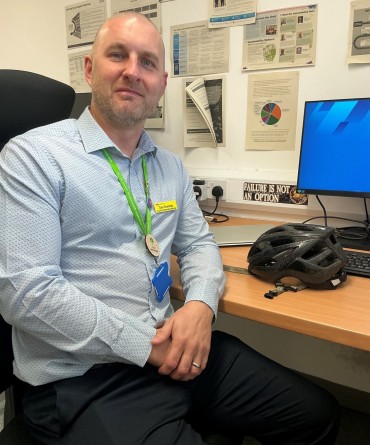
Say hello to Dan Braidley, Travel & Partnerships Manager
I’m part of the Trust Sustainability Team and my work contributes to the wider Trust sustainability agenda as we deliver our net zero carbon targets. I work closely with local authorities to make sure we align with their green aspirations, and a big focus of my work is on building relationships and finding areas where we can use better and greener travel and transport.
I’ve been working with the Trust for nearly 10 years. I genuinely enjoy my job. Everything I do is a team effort and my role often involves pulling everything together. Ultimately, any job is only as good as the people you work with; and I’m lucky enough to work with some genuinely great people both in our Trust and externally.
My role is fairly unusual, and I get to be innovative and represent the Trust regionally and nationally. I’ve built a network over the last 10 years with local authorities, transport providers, and NHS colleagues. I also like the fact that I’m very much ‘behind the scenes’: I do my little bit to ensure we are represented when some fairly major regional decisions get made, which ultimately helps us deliver our services to patients.
I think that the delivery drivers are our unsung heroes. They deliver bed linen, samples, drugs, and post all year-round in all conditions, and regardless of any operational or logistical issues. Phil Bland, who manages the service, has been great to work with over the years.
Mental health issues do not discriminate; it will affect us all at some point and it’s also important to keep ourselves on track throughout our day-to-day activities. I’m a founding member and trustee for Menfulness, a York-based men’s mental health charity. We’ve referred hundreds of men to counselling and engaged with thousands more who have benefitted from it makes me hugely proud.
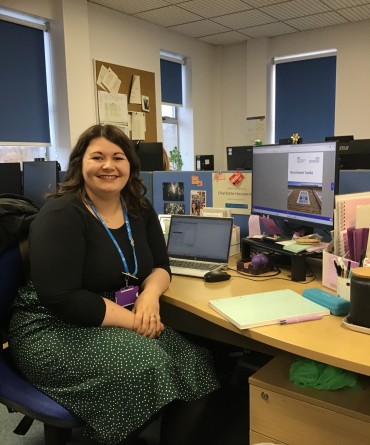
Say hello to Charlotte Housecroft, Recruitment Advisor.
My role covers every stage of recruitment, from advising managers about advertising vacancies to guiding candidates through their pre-employment checks. I also help run training sessions for managers on key stages of the recruitment process.
It’s a lovely part of the Trust to work in, as people are often so excited to be starting in their new role!
As part of my role, I’ve had the pleasure of working with an amazing group of colleagues over the past year to create something we’re proud of - our brand-new Recruitment Toolkit.
It’s an easy-to-use guide designed to support our managers with every step of the recruitment process. By giving our teams the right tools and information, we can make applying for a job with us smoother, faster, and more welcoming for everyone.
At the heart of this project is one clear goal: to make our Trust a place where people want to work – because when it’s easier for great people to find their way to us, everyone benefits - our teams, our patients, and our community.
I have been here for four years. I love seeing the impact that every area we recruit to has on patient care. We work with some amazing people, and it’s such a joy to be able to help people through such a positive and exciting part of their careers. Knowing that we are getting the people into the right role for them, and the impact that will have on patients, is really rewarding.
The entire Recruitment Team is incredible, but our Deputy Recruitment Manager, Lydia Szczerbicki, is the epitome of our Trust values. She constantly pushes us to be our best and is so supportive of change and improvement. She is an advocate for everyone and is one of the most encouraging and supportive people I have worked with.
It can feel a bit overwhelming at first when there is so much to learn, and so many acronyms and names for everything, but everyone is warm, helpful, and supportive. Don’t worry about knowing everything straight away, you will learn it in time and there is a supportive network to help you along the way.
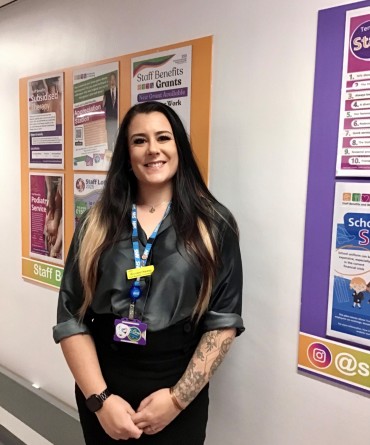
Say hello to Annabel Newey, Staff Benefits Co-Ordinator.
The Staff Benefits Team are dedicated to helping and engaging with Trust colleagues to support their personal and financial health and wellbeing. Day to day, my responsibilities can differ entirely, from planning and delivering staff events such as our summer fairs and Christmas markets, to scoping new partners and looking for ways to develop new benefits and incentives. No two days are the same
2025 marks my 10th year at our Trust, with over eight of those in the Staff Benefits Team. I love my role as I enjoy giving something back to our hardworking colleagues, whether that’s informing someone they’ve won £1000 on the staff lottery, or something small like helping a colleague get £25 towards a new fitness activity – it’s great to be able to make a positive difference.
During the pandemic, the hospital was flooded with donations. I took on the responsibility of managing these donations and creating care packages for colleagues across the Trust.
In such an uncertain time, seeing the generosity and kindness of the public and local businesses offering to support the NHS was truly heart-warming. In turn, witnessing the appreciation and gratitude from colleagues receiving care packages is something I’ll never forget.
My manager, Helen Hardwick, is an inspiring leader and the drive behind Staff Benefits. She encourages us to bring new and fresh ideas to the table, allowuing us the freedom of creativity while sharing her extensive knowledge. Helen helps us achieve our goals and supports personal growth.
I also admire the rest of my Staff Benefits colleagues because, like a bag of pick and mix, everyone brings something different to the team. Together, we support and motivate each other.
Go check out our Staff Benefits package! We offer so many options – my personal favourites including our staff shops, the summer fairs, staff lottery grants, and the buying and selling annual leave scheme. Visit www.york.nhs.uk/StaffBenefits for the full list.
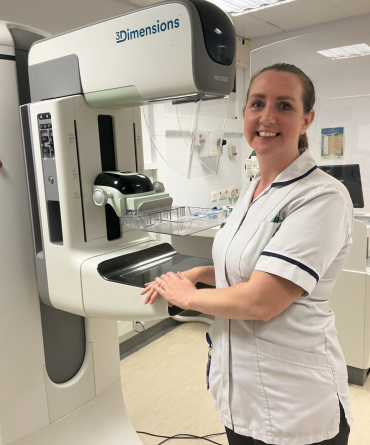
Say hello to Claire Stephenson, based at the Magnolia Centre, York Hospital
I am a Specialist Radiographer and Clinical Educator, as well as the Team Manager for Breast Imaging. My role is diverse and rewarding, encompassing patient imaging, staff training and development, service coordination, and the operational management of clinics and staffing. It’s a position that allows me to combine clinical expertise with leadership, ensuring the highest standards of patient care and service delivery.
I began my career at York in 2011 as an Imaging Support Worker in Radiology. I later completed my Radiography degree at the University of Leeds before returning to York as a Diagnostic Radiographer in 2017. Since 2018, I have specialised in Breast Imaging. I value working at the Trust because it fosters a culture of professional growth, collaboration, and innovation. The support and encouragement I have received throughout my career have enabled me to develop both clinically and personally, and I take great pride in contributing to a team that consistently delivers exceptional patient care.
Breast imaging provides many rewarding opportunities, particularly in health promotion and public engagement. Being involved in initiatives that encourage women to attend breast screening is a key aspect of my role, and during Breast Cancer Awareness Month, it’s been especially meaningful to see the positive impact of our efforts. Knowing that early detection through screening can save lives makes the work we do incredibly fulfilling.
I consider the entire Breast Imaging Team to be role models. Their professionalism, empathy, and commitment to delivering compassionate, patient-centred care set an outstanding example. I am proud to work alongside such dedicated colleagues who continuously strive to improve outcomes and experiences for our patients.
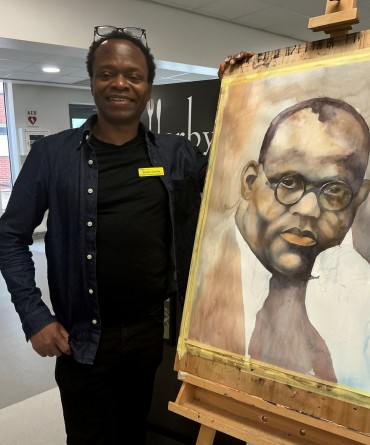
Say hello to Nduka Omeife, Patient Services Assistant at York Hospital
As a Patient Services Assistant on Ward 35, my main responsibilities include organising and helping patients to choose which food they would like to eat from our menus, serving meals, and providing drinks and snacks.
I've been working in this role since March 2023. I enjoy my job because I love caring for patients; helping where I can and making the experience of being in hospital as positive and comfortable as it can be.
Every day is special for me. What I find the most rewarding is when I really feel that what I am doing is making a difference for patients. That is what means the most to me. It’s also a nice feeling when patients and their families send ‘thank you’ notes or cards mentioning my name: sometimes it’s good to be appreciated!
I think that everyone in my team is a role model. From the ward sister and deputy sisters to the nurses, to the healthcare assistants, to the other patient services assistants: we work closely together as a unit. Everyone is very supportive, and I've learned a lot from them all.
Black History Month is a time for reflection, and recognising the ongoing struggles faced by the Black community. But it's also an opportunity to celebrate the strides made towards equality and justice. The Trust is marking this year’s event and colleagues are having conversations about Black History Month, and I think that’s really important.
My inspiration comes from these heroes themselves: whether it’s Stormzy or Sir Trevor McDonald! I'm proud to work with the York Hospital Arts team to make my dream of exhibiting here a reality. If you are visiting the hospital, come along and take a look. My paintings are on display in the main corridor on the ground floor.
#OneTrustOneTeam
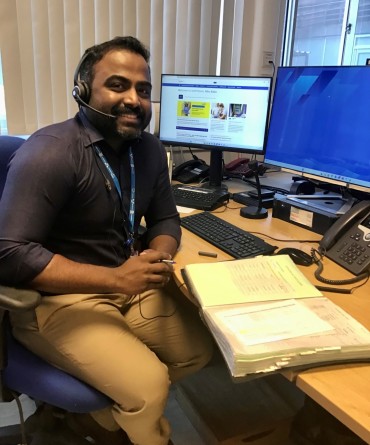
Say hello to Ribu Babu, a Switchboard Operator at York Hospital
As a Switchboard Operator, I’m often the first point of contact for patients, relatives, and staff calling into the hospital. From connecting urgent clinical calls and activating crash teams to supporting patients and relatives who may be distressed or unsure who to speak to, I act as a calm and reassuring voice on the other end. It’s a fast-paced, detail-focused role that plays a key part in patient care; even if we’re not always visible.
I joined the Trust in February 2025 and, right from the start, I felt supported and welcomed. No two days are the same, and it’s rewarding to know that the work I do contributes to patient safety and care in such a meaningful way. What I really value is the sense of responsibility and trust that comes with the role. It’s also a great feeling to know that behind every call, there’s a real person who may need help… and I can be part of making sure they get it.
A patient’s relative once called looking for information about a loved one but was very confused about which department to contact. I took the time to track down the right ward, confirm the patient was there, and pass on the correct number. A few days later, they called back just to say thank you. It was a small act, but it made me realise that even a short conversation can have a lasting impact when someone really needs to be heard.
I really admire my fellow Switchboard Team colleagues; especially those who trained and supported me when I first started. Their calmness during emergencies, their patience while training me, and their deep knowledge of the hospital’s inner workings really impressed me. Our line managers are also incredibly supportive, always encouraging us to develop confidence and independence in the role. They make a complex job look effortless, and they’ve inspired me to aim for that same level of confidence and skill.
Take your time to learn the systems and don’t be afraid to ask questions; there’s a lot to take in, but support is always available. Don’t underestimate the difference you can make, even in roles that aren’t always front facing. Be patient with yourself during the learning process; it takes time. Remember that every role here matters; what you do behind the scenes can have a real impact on patient care. Most importantly, always treat people with kindness, whether it’s a caller in crisis or a colleague asking for help; it really does go a long way!
Providing care together in York, Scarborough, Bridlington, Malton, Whitby, Selby and Easingwold communities
© 2025 York and Scarborough Teaching Hospitals NHS Foundation Trust | Accessibility | Site map | Cookies policy
York and Scarborough Teaching Hospitals NHS Foundation Trust is registered, and therefore licensed to provide services, by the Care Quality Commission (Provider ID: 1-114394658). For more information, visit www.cqc.org.uk

